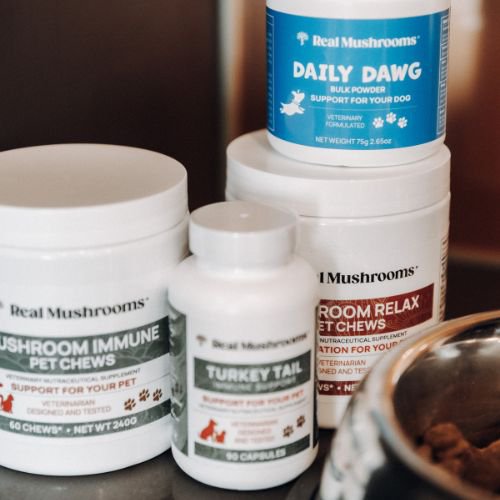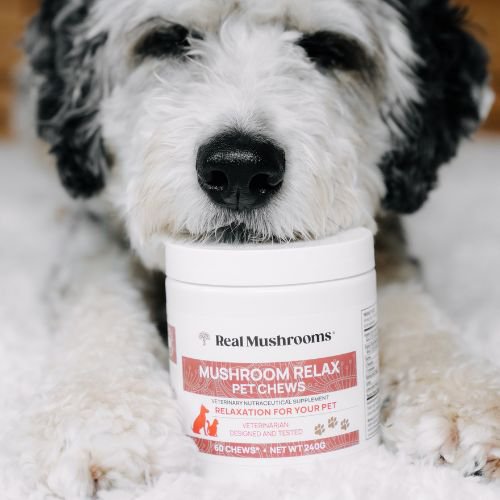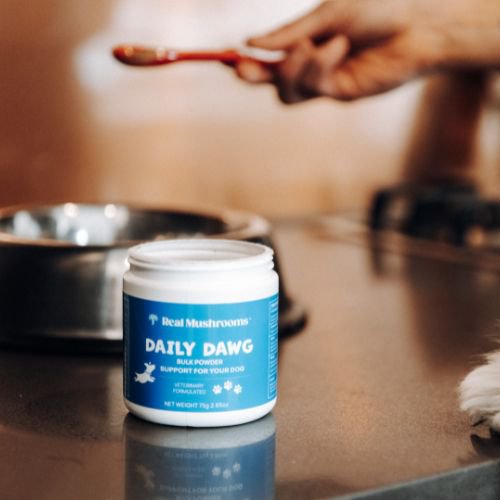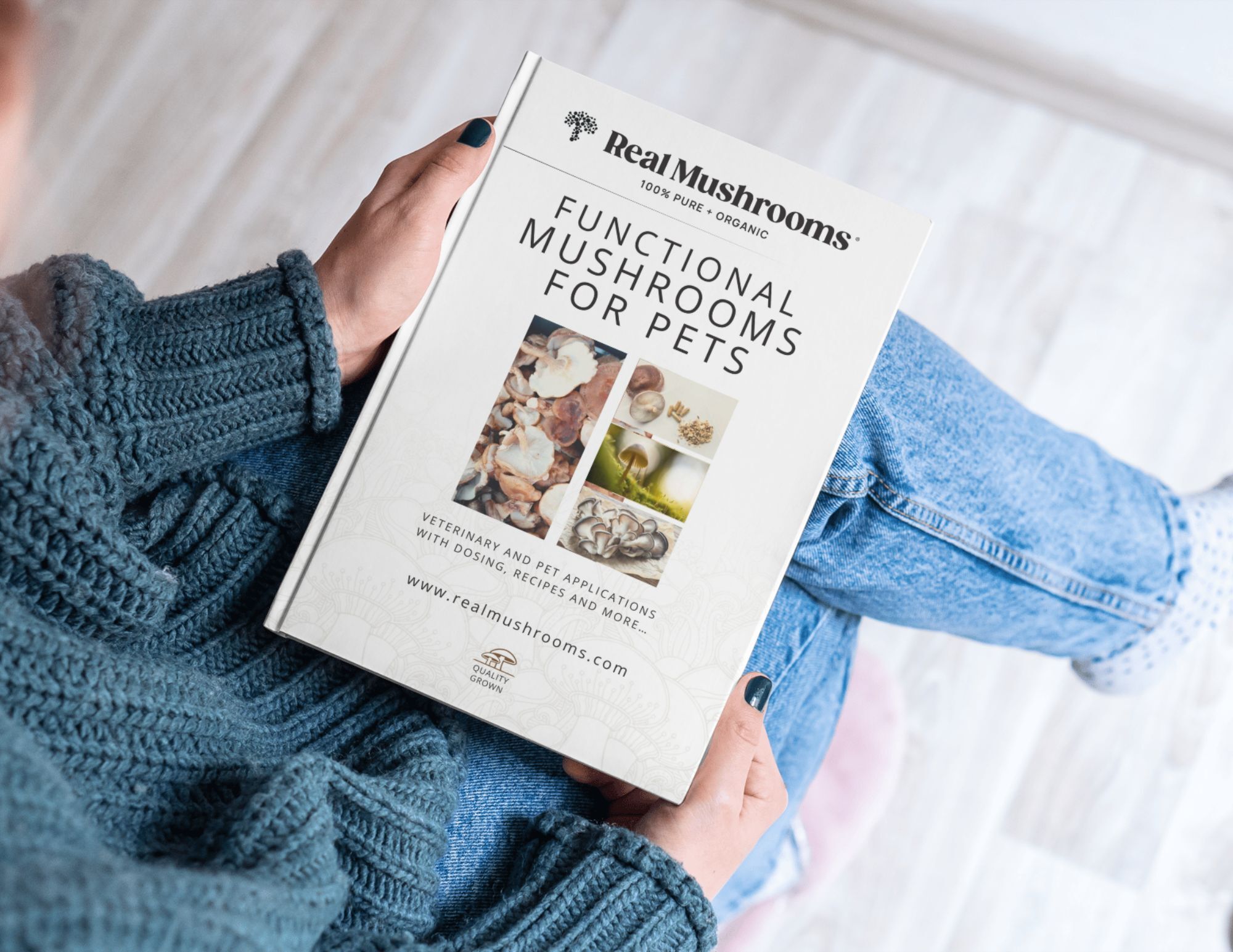Menu


As pets occupy increasingly important roles in our family lives, people are investing more than ever in maintaining their health. The veterinarian has become the furry child’s pediatrician. Also, pet parents look for the same wholesome nutrition in the pet food aisle as in the grocery aisle. They are also starting to add healthy supplements to the food bowl. Much as they do for parents and children, animal-specific supplements help enhance pet health, quality of life, and longevity (1).
Among those healthy supplements pet parents give their four-legged family members, mushrooms are now the fastest-growing category. As a result, pet parents are seeing great results in their pets’ health when they share their healthy meals and healthy supplements with them.
Are you looking to add healthy mushrooms to improve your pet’s health? Are you confused by all the different types of mushrooms and mushroom products available? In this article, I outline the basics of mushroom supplements, which ones to consider first, for what purpose, and ideally in what format.

As a holistic veterinarian, with over 40 years of experience in clinical practice, and as a formulator of pet health products, I’ve learned a few truths along the way. People need supplements that are easy and convenient to give daily to their fur babies. Additionally, palatability–your pet’s acceptance of its taste–is the most important consideration, other than product effectiveness.
Happily, mushroom supplements for pets come in various tastes, textures, and formats. In the next sections, I outline a few different mushrooms to consider for your pet. I also include notes about what to look for when buying mushroom supplements to satisfy the “three keys” above.
Not all mushroom supplements are palatable to some pets. One example is reishi (Ganoderma lingzhi), the “mushroom of immortality.” This mushroom, known for centuries, if not millennia, for its powerful, positive effect on the immune system, heart, and mind contains many active constituents (2). First I will explore the immunological advantages of this multi-purpose mushroom.
Some of the very active compounds found in reishi can be quite bitter-tasting. It is unique among the mushrooms for its high level of bitterness. This is especially true when the compounds have been concentrated during the mushroom extraction process to make them more bioavailable.
The bitterness of these compounds, called triterpenes, is a hallmark of their potent activity. The triterpenes in reishi, while bitter tasting, possess several properties that could substantially help your pet’s immune system.
For one, they stabilize mast cell membranes. Mast cells are cells of the immune system that contain histamine. When an allergic reaction occurs, they release that histamine, which causes many of the symptoms we see in pets with allergies.
Reishi, as well as Chaga (Inonotus obliquus) triterpenes, have been found, in several objective studies, to “stabilize” mast cell membranes, thus preventing the release of histamine. This reduces, and may even eliminate allergic symptoms, like itching and redness of the skin, congestion of upper respiratory passages, and even the edema and swelling of the skin often seen with allergic reactions (3,4).
However, the bitterness of these powerful compounds means that some pets will refuse to accept this mushroom powder in their food, due to that bitter taste. The more concentrated the reishi extract, the more bitter it tastes. At the same time, reishi is a great mushroom for supporting the immune systems of people and their beloved pets.
Luckily, there are solutions for providing your fur baby with the mushroom benefits of reishi in a way they will accept. You can give your pet a reishi extract as a capsule. Or you can find it blended into a tasty treat, like the Mushroom Immune Chews™ I created for Real Mushrooms.

Reishi triterpenes can also be helpful to a nervous pet. Some of these triterpenes activate the same membrane receptors in the brain that make CBD such a powerful calming agent. Zen Masters, over the centuries, have reached for reishi as a calming, grounding, and centering meditation aid. This property makes reishi useful for your nervous, sensitive, four-legged family member(s) (5).
If you want to help your nervous pet, but they are a bit picky about how things taste, then reishi capsules would be a good solution. However, to give a capsule to some pets is an impossible dream. This is why I formulated the Mushroom Relax Chews™, which are tasty, and contain reishi and lion’s mane (Hericium erinaceus) that work together to help calm your pet down.
For more information about reishi mushroom benefits, read our article Reishi Mushroom For Dogs: The Secret Sauce For Pet Longevity.
Turkey Tail (Trametes versicolor), like reishi, contains many powerful triterpenes responsible for its incredible immune benefits. However, it is not as bitter as reishi. It has a slight earthy, sour taste, but is much more acceptable to pets when given as a concentrated powder mixed with their food. However, still some pets will refuse to accept it. For those pets, Turkey Tail capsules, or the Mushroom Immune chews™ would be the way to improve your pet’s acceptance of it.
To be effective for its immune benefits, Turkey Tail (and,really, all mushrooms) needs to be given daily. And, for its more pronounced immune benefits, it should be given in fairly substantial amounts. Capsules or chews are the answer if your pet is reluctant to take the mushroom powder when blended with their healthy meals.
For more information about the benefits of turkey tail mushrooms, please read our article Turkey Tail Mushrooms for Dogs: A Versatile Fungi for Pet Health.
Some functional mushrooms are milder and more palatable for pets. Two of these are ideal for supporting your pet’s gut health and are perfect for picky eaters with sensitive stomachs. These are chaga and lion’s mane.
Chaga (Inonotus obliquus), which has a fair share of potent triterpenes, is a fungus but not a mushroom. It is mycelium that has grown into the bark of the birch tree. It derives some of its potency from compounds found in the birch tree bark, such as betulinic acid.
Betulinic acid is yet another kind of triterpene and can improve digestive health. Animal studies have shown that betulinic acid eases intestinal impairments and protects against intestinal mucosal injury (7,8). It also helps resolve imbalances in inflammatory responses that are the root causes of gut problems (9,10,11).
In addition to mycelium, chaga is made largely of lignan, an organic substance binding the cells, fibers, and vessels in wood. This substance helps to dilute the bitter taste of the triterpenes. Therefore, most pets will find the chaga extract powder palatable and acceptable when blended with their food.
Lion's Mane (Hericium erinaceus) is primarily celebrated for its cognitive benefits. Yet, it is also an effective support for the actions of the gut, referred to as “The Second Brain,” and the gastrointestinal system. Its brain-like appearance and unique bioactive compounds have been studied for their beneficial effects on the gut and digestion.
Since lion’s mane mushroom extract has a very mild taste, akin to seafood, it is generally the most palatable of the mushroom supplements to mix as a powder into your pet’s food. Even the pickiest of cats tend to enjoy the flavor! Lion’s Mane is all the more valuable as a supplement for pets with digestive issues because of its attractive taste.
Lion's Mane contains polysaccharides, such as beta-glucans, which can promote gut health. These compounds can help balance the gut microbiota, enhancing the growth of beneficial bacteria. Animal studies have demonstrated that Lion's Mane can help maintain the integrity of the gastric mucosa, the lining of the stomach. For example, a study on rats showed that Lion's Mane extract helped maintain a healthy stomach lining when exposed to ethanol (12).
The properties of Lion's Mane are particularly beneficial for pets with digestive discomfort. By promoting a healthy response in the gut, Lion's Mane can help alleviate symptoms such as occasional pain and discomfort. Research has shown that the mushroom's extracts can support a healthy balance of gut proteins involved in the digestive process. In one study, rats with induced digestive discomfort were treated with Lion's Mane extract, thereby improving digestive health and comfort (13).
In another study (14) Japanese researchers added powdered Lion’s Mane mushroom to dry dog food and were able to measure improvements in microbiome health as a result.
Lion's Mane has also been shown to support overall digestive function by stimulating the activity of digestive enzymes, improving the breakdown and absorption of nutrients. This is particularly important for pets with digestive inefficiencies or those recovering from gastrointestinal disorders. In one study, Lion's Mane extract enhanced the activity of pepsin and lipase, key enzymes involved in protein and fat digestion, respectively, supporting better nutrient absorption and digestive health (15).
Since Lion’s Mane is generally accepted by dogs and cats alike, you can turn to the economical option of purchasing Real Mushrooms’ bulk Lion’s Mane extract powder to mix into their food. Alternatively, you can give Lion’s Mane capsules to your pet.

Some of our most powerful functional mushrooms are also some of our most tasty edible mushrooms. I am referring specifically to shiitake mushrooms (Lentinula edodes), as well as maitake (Grifola frondosa) and oyster mushrooms (Pleurotus ostreatus). When you combine mushrooms into a blend, research has found that a blend of functional mushrooms produces a synergy that results in a more potent effect than each mushroom on its own (6).
The difficult palatability of reishi and turkey tail for some pets can be substantially reduced when they are blended with the more tasty mushrooms. Many pets who would not accept reishi or turkey tail alone, will readily accept these two powerful mushrooms in a mix with tasty shiitake, maitake, and “barky” tasting chaga.
These 5 mushrooms are in the proprietary Real Mushrooms blend, 5 Defenders™. You can try to feed the powder, which most pets accept. If your pet is a bit reluctant to eat the powder when blended in their food, this powder is also available in capsules and in the tasty Mushroom Immune chews™.
Fresh, cooked mushrooms are often included in healthy meal plans for people. Likewise, adding fresh culinary mushrooms to your pets’ diet will make their meals healthier.
There are two important things to keep in mind when providing your pet with fresh whole mushrooms:

Incorporating any functional mushroom into your pet's diet can be a practical way to support their overall immune health and specific health concerns.
The mushroom extracts from Real Mushrooms’ pet line can be given as a powder mixed with their food, in capsule form, or as a tasty chew.
Mushroom supplements are a quick, easy, and repeatable way to benefit the health and longevity of your four-legged family member when given daily. Like supplements for humans, the effects of functional mushrooms are experienced and maintained by ongoing, regular use.
Despite the genuine safety of functional mushrooms, If you have concerns start with a small dose and gradually increase it, monitoring your pet's response.
Pets are our four-legged family members and we need to provide them with the same benefits as our other family members receive from healthy foods, healthy lifestyle, and healthy mushrooms.

Disclaimer: The information or products mentioned in this article are provided as information resources only, and are not to be used or relied on to diagnose, treat, cure, or prevent any disease. This information does not create any patient-doctor relationship, and should not be used as a substitute for professional diagnosis and treatment. The information is intended for health care professionals only. The statements made in this article have not been evaluated by the Food and Drug Administration. Any products mentioned are not intended to diagnose, treat, cure, or prevent any disease. The information in this article is intended for educational purposes. The information is not intended to replace medical advice offered by licensed medical physicians. Please consult your doctor or health practitioner for any medical advice.

– Plus, Enjoy Exclusive Tips and Updates with Our Real Mushrooms for Pets Newsletter